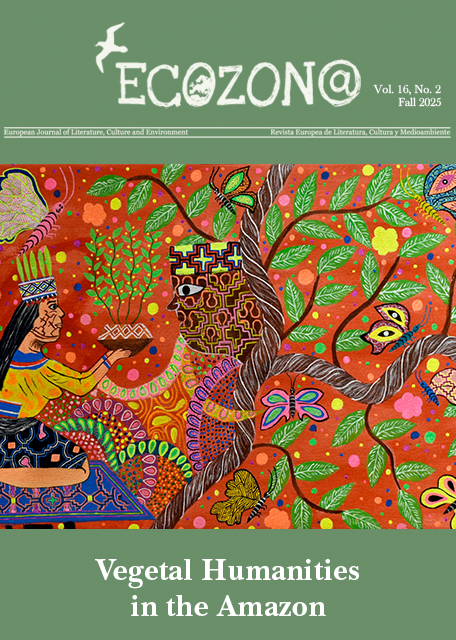<b>“This series will take you to the last wildernesses” – <i>Planet Earth</i> and the Question of the Animal</b> // "Esta serie os llevará a las últimas tierras salvajes" - <i>Planeta Tierra</i> y la cuestión del animal
DOI:
https://doi.org/10.37536/ECOZONA.2013.4.2.536Schlagworte:
Planet Earth (2006), non-human Othering, emotional involvement, maintenance and deconstruction of nature-culture divide, nature documentaries, otredad de no-humanos, implicación emocionalAbstract
Although generally marketed as disinterested and scientific sources of information, blue chip nature documentaries actively participate in both the maintenance and subversion of the nature-culture dichotomy. Using the award-winning BBC mega series Planet Earth (2006) as its example, the following article illustrates how non-human animals are presented as other to humans, but also argues that the degree and mechanisms used vary depending on the familiarity of both the species and habitat in question. In keeping with current ecofeminist theories, particular attention is also paid to scenes where the hierarchy reveals traces of its own production, which are revealed by a close reading of some sequences from three different episodes of the series. These traces allow a perceptive audience to question the othering of the non-human. One particularly potent problematisation of these narratives occurs whenever the series appeals to the audience’s emotional engagement, since such an emotional appeal also weakens the documentary’s overt claim to disinterested objectivity. Thus, on a metalevel, the article also furthers research into how documentaries can function as emotional machines.
Resumen
Aunque los documentales punteros sobre la naturaleza generalmente se anuncian como fuentes de información científica imparcial, también participan activamente en el mantenimiento y la subversión de la dicotomía entre la naturaleza y la cultura. Usando como ejemplo la premiada mega serie de la BBC Planet Earth (2006), este artículo ilustra como los animales no-humanos se presentan como el otro, pero también sostiene que el grado y los mecanismos que se usan varían dependiendo de la familiaridad de ambas especies y el hábitat correspondiente. Con arreglo a las teorías ecofeministas actuales, se presta especial atención a las escenas en que la jerarquía revela los signos de su propia producción, que se revelan con un análisis escrupuloso de algunas secuencias de tres episodios diferentes de la serie. Estos signos permiten a una audiencia atenta cuestionar la otredad del no-humano. Una problematización especialmente potente de estas narrativas tiene lugar cuando la serie apela al compromiso emocional, ya que esto también debilita la pretensión de objetividad desinteresada. Por ello, en un metanivel, el artículo promueve la investigación sobre cómo los documentales pueden funcionar como máquinas emocionales.
Downloads
Downloads
Veröffentlicht
Ausgabe
Rubrik
Lizenz
Authors who publish with this journal agree to the following terms:
a) Authors retain copyright and grant the journal right of first publication with the work simultaneously licensed under a Creative Commons Attribution License that allows others to share the work with an acknowledgement of the work's authorship and initial publication in this journal (CC BY-NC for articles and CC BY-NC-ND for creative work, unless author requests otherwise.
b) Authors are able to enter into separate, additional contractual arrangements for the non-exclusive distribution of the journal's published version of the work (e.g., post it to an institutional repository or publish it in a book), with an acknowledgement of its initial publication in this journal.
c) Authors are permitted and encouraged to post their work online (e.g., in institutional repositories or on their website) prior to and during the submission process, as it can lead to productive exchanges, as well as earlier and greater citation of published work (See The Effect of Open Access).










